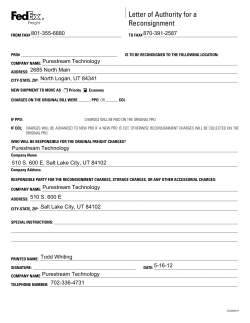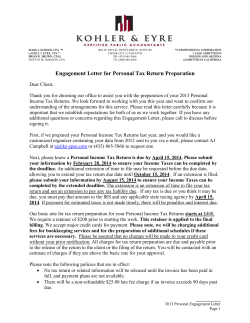
Leaseholder and Tenant Service Charges Conference Plenary three: How to calculate and
Leaseholder and Tenant Service Charges Conference Plenary three: How to calculate and apportion service charges effectively Speaker: David Hunter Partner, Beevers and Struthers Chair: Steve Michaux Group Director of Leasehold Services A2 Dominion Housing Group Beever and Struthers How to calculate and apportion Service Charges effectively Presented by: David Hunter 03 December 2013 David Hunter • Partner, Social Housing Team, Beever and Struthers. • 32 years sector experience in Statutory Audit, Business Assurance, Governance, Risk Management and Financial Consultancy. • 10 years as LSVT Board member at Wulvern Housing from Shadow Board. • Board member of commercial subsidiary Wulvern Platform. Fixed and Variable Service Charges: Definitions • A fixed service charge is where the landlord estimates the cost of providing services to a property at the beginning of each financial year. The tenant pays the service charge throughout the year and at no point will there be additional amounts to pay or refunds due back. o The usual method with tenants. • Variable service charges occur where the landlord sets an estimated charge at the beginning of the financial year, and then produces a final account once the year is complete. The final account compares the actual costs in delivering services to a property against the estimate that was set, and may result in a credit back or an additional amount due from the resident. o The usual method with leaseholders. Fixed and Variable Service Charges: Best Practice “The decision between a fixed and variable service charge regime is one for each housing association to make, and often will be finely balanced. A variable regime means much more stringent procedures but in exchange it guarantees that the landlord… can recover every penny spent on services. Generally, the larger the service charge in relation to the net rent, and the likelier it is to vary unpredictably from year to year, the stronger the case for a variable charge. However, in general needs housing, where service charges are relatively low and reasonably stable, a regime of fixed charges may well be adequate.” National Housing Federation – Service Charges – A Guide for Housing Associations Perspective: Fixed Service Charges • Historical For rental properties, losses could be offset: o Revenue Deficit Grant o Hostel Deficit Grant o Grant Redemption Fund o Rent Surplus Fund • More Recently Service Charge Deficits from rental properties o 2010 / 11 £22.1m for the Top 60 RPs Revenue / Capital? • Revenue Service Costs o Day to day running costs o Repairs only for Leaseholders o Charged to Leaseholders and Tenants o Charges must reflect actual costs and be reasonable o Consultation and Section 20 notices o Demands for payment within eighteen months • Capital Service Costs o Components and Fabric of the building o Charged to Leaseholders only o Charges must reflect actual costs and be reasonable o Consultation and Section 20 notices o Demands for payment within eighteen months Calculation of Service Charges • Leaseholder Service Charges must be provided for in the lease o Include capital and revenue items • Right to Buy – restricted to Section 125 Notice • Tenant service charges must be provided in the tenancy agreement and include revenue items only • Need to decide what services to charge for o For example, Lifts? • Calculation should include the direct costs and indirect costs of the service A practical response • Keep it Simple • Tenants want to know how much they are paying and what they are paying for • Administering variable charges could cost substantially more than fixed charges • Where Fixed charges are made tenants should still be given information about the services provided and their costs Dealing with Big Ticket Items and more Complex Services • Staffing Costs (wardens, managers, caretakers & concierges) – Full salary plus on-cost less a percentage for general housing management o Caretakers – apportion between estates and then between general management and service activities o London Rent Assessment Committee decided in 1967 that an appropriate appropriation to service charges is 15% • Heating and Lighting Communal areas o One option to apportion the total electric bill between flats and communal areas based on floorspace and recover the communal element as a service charge Dealing with Big Ticket Items and more Complex Services (continued) • Cleaning communal areas o May be done by caretaker, warden, cleaner or contractor o Need to apportion the cleaners’ wages between communal areas and other work and add appropriate on-costs • Major component replacement o Consultation o Lease / restrictive covenants • Solar Panels o Capital o Re-charge of electricity Variable Service Charges for tenants: Does CLARA apply? • CLARA = Commonhold & Leasehold Reform Act 2002. This amended provisions for variable service charges under the 1985 & 1987 Landlord & Tenant Acts • Section 152 outlines the information that must be provided to tenants and allows for tenants to withhold service charges if inadequate information is provided (however this has yet to be enacted) • Section 153 provides for an accompanying notice. • Section 154 entitles a tenant to inspect documents Large Open Spaces and Policies on Recharging through Service Charges • Costs vary greatly o Work carried out by contractors, staff or residents o Sometimes a need to include maintenance & depreciation of plant o Non-recurring costs such as tree surgery • Example: a Local Authority divided the borough into three zones and calculated a service charge for grounds maintenance in each zone per bed space o Not ideal – a more specific method could have been better Apportionment Techniques • At what level should costs be collected? o Block o Estate o Scheme o District • How to apportion costs to dwellings? o Units o Bedrooms o Bed spaces • Is there an intermediate stage of apportionment? o For example using floorspace to apportion total costs between schemes Calculation of Administration Fees • Administration fees can be based on: o Actual costs o The cost of the staff employed in administering service charges plus appropriate oncosts Estimated costs An on-cost on the cost of the other service charges 10% - consistent with advice of the rent officer who also says 15% is acceptable for housing associations • Difficulty in identifying actual costs is recognised: o “Payment of a management charge based on a percentage of costs is not intrinsically unreasonable, having regard both to the position of the purchaser and of the vendors.” – Mahase v London Borough of Camden 1996 Good Practice Service: Audit Commission • Provides comprehensive information to all service users that clearly describes the organisation’s rent and service charge setting policy, and how rents and service charges are calculated and collected. • Delivers accurate and timely information about rent and service charge accounts to service users, for example quarterly rent and service charge statements. • Minimises and prevents arrears by ensuring that new rent accounts are always set up, and means of payment supplied to new tenants, before tenancies commence. • Ensures that accounting systems are well integrated with housing management and benefit systems. As a result the organisation can clearly identify arrears due to housing benefit claims or payment in credit or arrears. • Separately records and accounts for rent arrears, court costs, rechargeable repairs and other debts Accounting Requirements “The accounting records are the responsibility of the landlord… The records need to be sufficient to show all transactions involving service charges monies and to enable the person preparing the information to be satisfied that the information complies with the legislation. The accounting records would be expected to contain: • Details of all sums of money received and expended by the landlord… and the matters to which the receipts and expenditure relate. • Documents such as invoices to support all the figures entered in the accounts. • Details of longer term contracts and income and expenditure in relation to these contracts.” • Draft guidance on the accountants’ report on service charges Leasehold Valuation: Tribunal Decisions • Service Charges quashed where: o Leaseholder not properly consulted Westminster £2million • Work not necessary o Islington – roofs to flats - £200,000 • Work poor • Costs excessive Conclusions • Decide what to charge for based on statute, case law and the provisions of leases and tenancy agreements o Decide between fixed and variable charges • Identify all appropriate costs • Apportion costs between schemes and tenants based on the best available information • Ensure charges represent Value for Money • Keep it Simple • Consult and provide complete information Thank you for attending. Any Questions or Comments? Your opinion is valuable to us so please don’t forget to complete your feedback form St George’s House 215-219 Chester Road Manchester M15 4JE t: 0161 832 4901 f: 0161 835 3668 w: www.beeverstruthers.co.uk
© Copyright 2025









